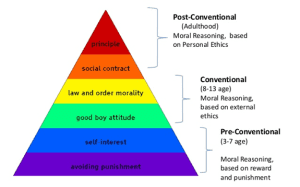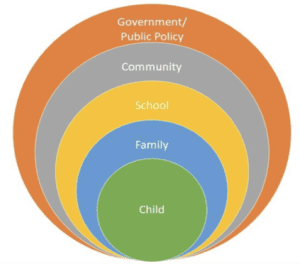THE STRUCTURE
● Introduction: Give a brief about socialization and its importance in development of a child.
● The Body:
○ Write about socio-cultural values and their importance in the development of the child.
○ Write about moral values you learnt during your school.
● Conclusion: End with the importance of moral values and its uses in your life.
Ans. Socialization is one of the most important phenomena in developing moral understanding in the child. Family plays the most important role in inculcating moral understanding in the child. Apart from family, schooling, peer group and society also plays important role in the moral development of the child.
Family and socio-cultural values help in developing moral understanding in individuals at the early stage of life. A tender child is considered as a clay and it can be given shape/mould as per the family values andd what society considers desirable. Theoretically, the process of socialization has been explained by Kohlberg as follows:
Six stages of Moral development by Lawrence Kohlberg:
1. Reward- Punishment
2. Reciprocal behaviour
3. Good Boy, Nice Girl
4. Obedience to law
5. Utilitarian stage
6. Kantian stage

Beliefs, values, traditions and habits etc., are some examples of socio-cultural values; these also form a major component in shaping the moral understanding of a child. Socio-cultural values that society follows also become the basis of the moral understanding of a child.

Moral values generally learn in childhood:
● Hard work: Hard work being taught in schools is a key moral value, which is important and relevant throughout life and in different aspects of life as well. Be it personal life, professional life, or work ethic, hard work is relevant everywhere.
● Honesty: Being taught to value honesty from a young age helps individuals understand the importance of truthfulness, integrity, and trustworthiness. This value is relevant in personal relationships, professional settings, and society as a whole, fostering sincerity and open communication.
● Compassion: Encouraging empathy and compassion toward others cultivates kindness, understanding, and a willingness to help those in need. These values contribute to building a more caring and supportive society, fostering social harmony and collective well-being.
● Responsibility: Instilling a sense of responsibility in children helps them understand the consequences of their actions. Teaching them to take responsibility for their choices and obligations develops accountability, reliability, and self-discipline, which are crucial traits for personal growth and societal cohesion.
● Integrity: Instilling the value of integrity involves encouraging individuals to act in alignment with their moral principles and values. This includes being honest, trustworthy, and having a strong sense of personal ethics.
Conclusion: Moral understanding and moral values learnt in early life remain valuable throughout their life, in different aspects and fields of life, they make human ethical and improves moral conduct. Family, society, and peer groups are important from birth, and they consist of good socio-cultural values imperative.
Spread the Word



